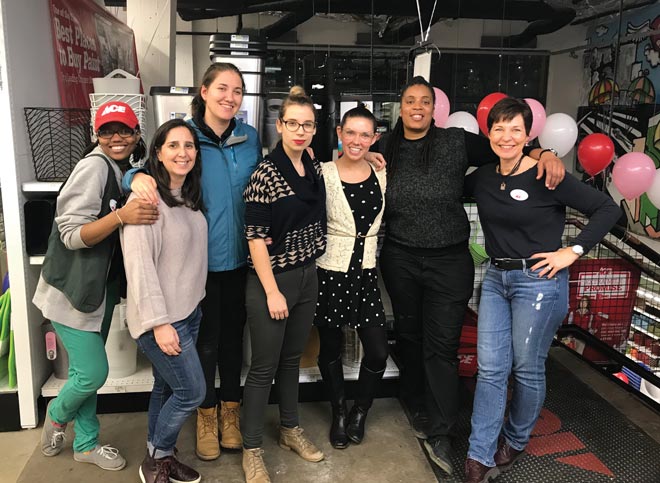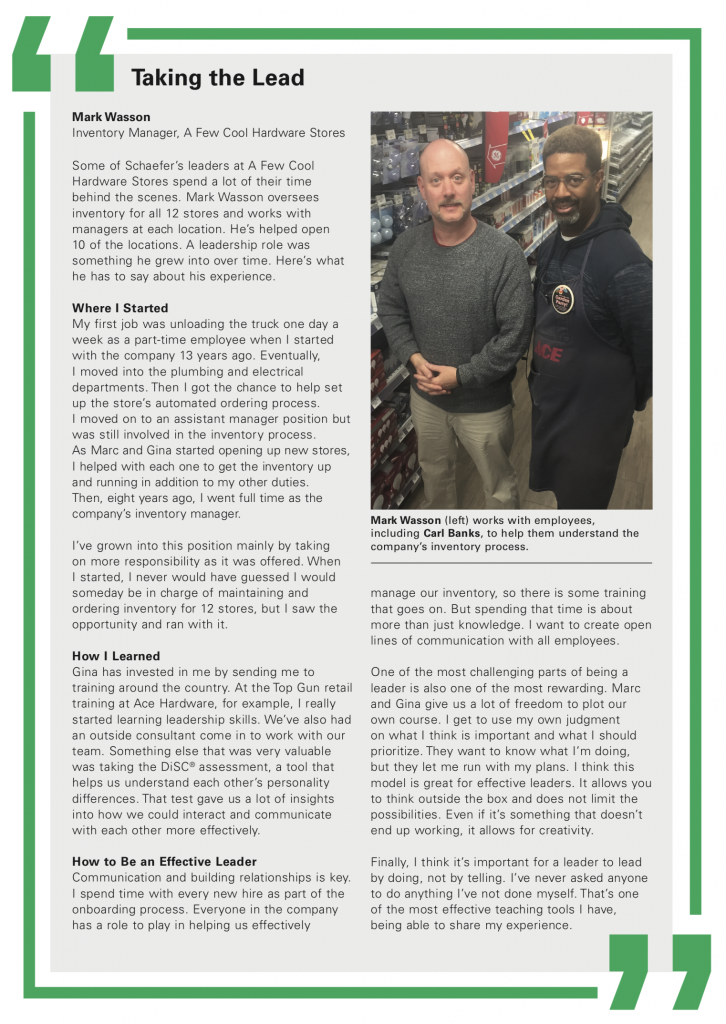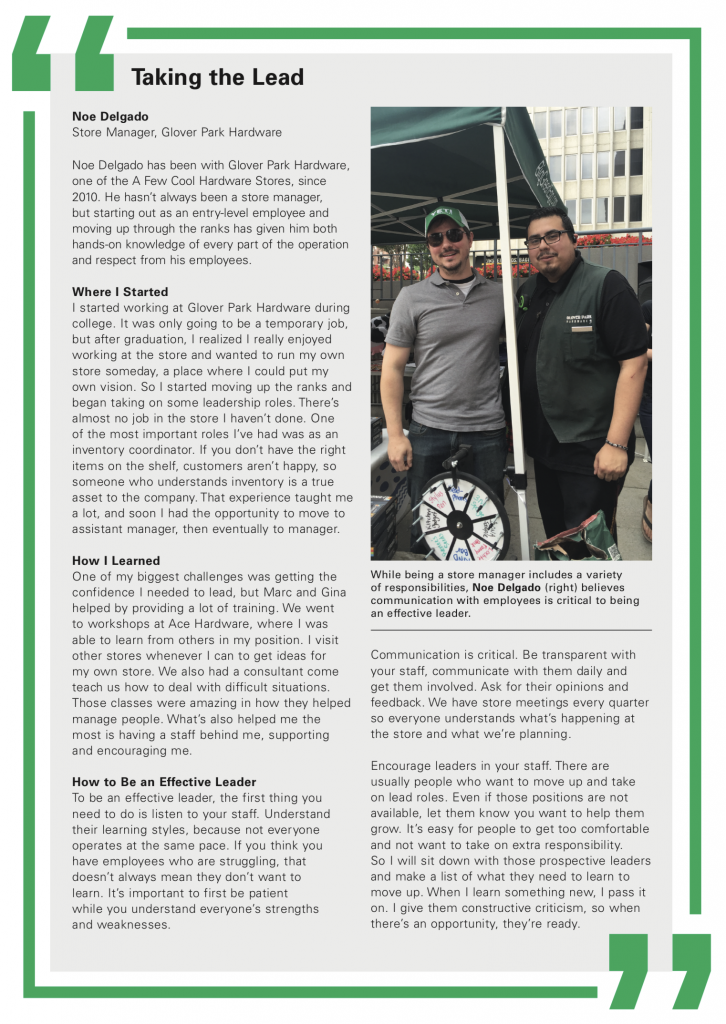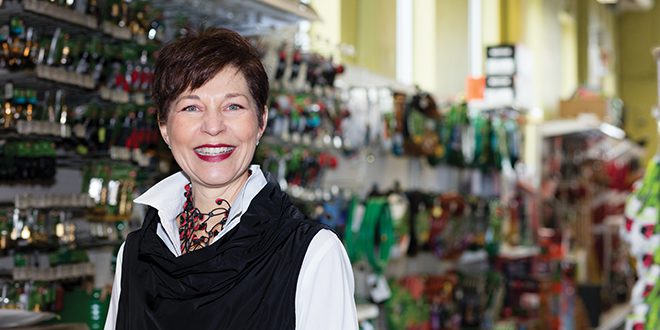Click on the image above to download a PDF of this story.
By Jesse Carleton, jcarleton@nrha.org
In March, A Few Cool Hardware Stores, headquartered in Washington D.C., celebrated its 15th anniversary. That amount of time may seem short compared to retail operations that have been around for generations. But during those years, owners Gina Schaefer and Marc Friedman have grown the business from one location to 12 with more than 280 employees. Today, the husband-wife duo shows no signs of slowing down.
For Schaefer and Friedman, fast growth has required a style of leadership that isn’t afraid to let go of some control. Their business consists of convenience-style hardware stores scattered throughout urban Washington, D.C., neighborhoods. Each store is custom-made to meet the unique needs of its local community. Each is run by a store manager empowered to make decisions about what is best for that location.
While letting go of some control may seem frightening to some business owners, Schaefer believes it’s been essential to the growth of her business. It’s also one of the marks of a strong leader. Growing and managing a successful, multilocation operation takes a lot of hard work and strong leadership, not only from yourself but also from those around you.
While Schaefer and her husband have been developing staff to help run their stores, she has distinguished herself both locally and nationally for her insights on leadership. She has served on the board of directors for a variety of organizations, including her co-op, Ace Hardware, and several nonprofit organizations. Currently, she is on the board of the multibillion dollar company CCA Global, a co-op whose holdings include the Carpet One Floor & Home chain of stores. She has presented on the topics of customer service and leadership to companies across the country. In the community, she is a vocal advocate of buying local and urban growth. In 2011, the North American Retail Hardware Association named her one of its Top Guns, an award given to best-in-class retailer operators.
Below, you can look deeper into Schaefer’s perspective on what she feels every retailer needs to know to be an effective leader. And since an important part of her work has revolved around teaching others to lead, two of her team members will share how they’ve developed their own leadership styles.
Trust Your Employees
It may be both a flaw and a strength, but Schaefer admits she and her husband are both very trusting people. “I know that can get you into trouble with some people, but at the same time, because we are trusting, we’ve been able to work with some cool people throughout the years,” she says.
Trust is a critical characteristic of a leader. If you can’t trust those you’ve hired, then you might need to rethink why you’ve hired them. If you do have that trust, then you can make tremendous progress in your business.
“There’s a little bit of vulnerability involved,” she says. “You can’t teach trust, but as a leader it’s an important trait. If you can hold on to that trust, then magical things can happen.”
The best example Schaefer can point to is the challenge of expanding a business to multiple locations. Many business owners struggle with opening the second location because they want to be in two places at once. They’ve either not found an employee fit to run the second location, or they’re unwilling to relinquish control to someone else. However, learning to trust an employee to make critical decisions will free up your time.
That attitude shines through in Schaefer’s decision-making process. While she and her husband are ultimately in charge of the business, they are always seeking input from their leadership team. “There’s not always one easy way to solve a problem,” she says. “And some people assume that the boss is going to come down from on high and dictate what is going to be done. But I truly believe work is a collaborative effort.” She wants her leadership team to have input on matters that affect the entire company, just as she expects their support for the final decision that is made.
One of the reasons Schaefer can put so much trust in her team is that she’s been careful to develop their skills. Most of her leaders come from within the company, so they usually have hands-on experience with many parts of the operation. Managers receive leadership training at an off-site program offered by their co-op. There are also monthly management meetings that include a leadership training component. For employees who aspire to move up in the company, Schaefer will put together an individualized development plan that shows the steps they need to complete and the skills they need to acquire to reach their goal.

Become a Stellar Motivator
Supporting the communities surrounding her stores is something Schaefer does every day, so it’s no surprise that her first exposure to business leadership was through nonprofit organizations. Throughout high school and college, she worked for a nonprofit in event management and development, and she expected that to be the trajectory of her career. When she moved to Washington, D.C., asan adult, it was to join a nonprofit organization. That experience tempered her perspective on how leaders motivate.
“Managing a business and a nonprofit has many similarities, but when you start managing a team of people who are doing something for very little financial compensation, you develop good motivational skills,” she says. Those working for a nonprofit are less likely to be working with a paycheck as the end result, as the pay is generally low. Rather, they tend to be working for some greater good. That sense of a more intangible goal has to be the source of inspiration, especially when juxtaposed against a low wage.
In fact, Schaefer discovered that not all employees are motivated by wages alone. After working for nonprofits, she spent time working for a technology firm at a time when that industry was experiencing a bit of volatility. As a member of the human resources department, Schaefer says her job was to try to keep employees from leaving to go work somewhere else. “People were jumping ship daily because other companies were throwing money at them,” she says. “We built a game room, threw parties, took trips, all to keep employees, who were already very well-compensated, from leaving the company.”
Today, she draws on both experiences when it comes to engaging her staff. Schaefer wants her employees to be well-compensated. She pays a higher-than-average wage for retail (she’s actually a vocal advocate for raising the minimum wage) and offers a range of benefits, such as a health care plan, profit sharing and a 401(k) program. She also wants the store to be a fun place to work. “We do a lot of really fun stuff, whether it’s offering discounted movie tickets or throwing summer picnics,” she says.
But Schaefer also realizes that, similar to her time in the nonprofit sector, motivation needs to come from a deeper sense of mission. Her business operates on a set of eight core values, such as “communicate respectfully,” “be an awesome team member” and “embrace and drive change.” Just as those in a nonprofit look to their mission statement for direction and motivation, Schaefer holds up those eight core values as the code for all employees.
Motivated employees are happier, too. There’s a trickle-down effect that starts at the top and goes all the way to the customer. Good upper-management leaders inspire good store managers, and if those managers lead well, they create happy employees. If employees are happy, then they treat customers like they want to be treated. Happy customers mean more sales.

Never Stop Learning
One of the greatest misconceptions leaders may have about themselves is that they shouldn’t ask for help, says Schaefer. “We don’t know everything and we can’t think we know everything,” she says, adding that it’s important to look around for opportunities to learn.
To start, be aware of your weaknesses as a leader. Schaefer says her strengths lie in her ability to see the big picture, to cast a vision. She doesn’t much enjoy the details or the numbers side of the business. She’s thankful her husband is willing to run the finance department. But she also knows it’s important for her to keep her skills in that area sharp.
“I knew that to be a good leader, I needed to fill the gaps in my knowledge,” she says.
About three years ago, she hired a business coach to increase her knowledge of finances, even though her husband would continue to run the department.
In fact, Schaefer utilized a leadership coach to work with her entire leadership team. For three years, the coach came in once a quarter and led the team through a variety of exercises to help them develop and refine their leadership skills.
Schaefer looks for opportunities to expand her own knowledge anywhere she can. A few years ago, she was accepted to a program called Leadership Greater Washington. It’s part of a network of leadership groups across the country. Along with networking and learning from a cohort of leaders outside of her industry, Schaefer learned more about a wide range of topics that were pertinent to her local business community.
And what else does she do? “I admit I’m a bit of a leadership nerd,” she says. “I read books, listen to podcasts, whatever it is that can help me be better.”

Identify Leaders to Admire
In addition to personal development, there’s a lot to learn by studying the careers of others who have been successful in business. When Schaefer gives a presentation to another group of retailers, she will often share stories about leaders who have influenced her in some way. While there are many Schaefer says have been an inspiration to her, a few rise to the top, and they are all from outside the home improvement industry.
Paul Saginaw and Ari Weinzweig are business partners who formed Zingerman’s Delicatessen, a family of businesses in Michigan. Schaefer met them at a leadership conference several years ago and quickly resonated with their commitment to their community. While the two had aspirations to become a large company, they wanted to stay local and grow by promoting leaders from within their company.
“They are a very large and successful company, and they’ve created a lot of good leaders,” she says. “They’ve helped me home in on my mission to be fiercely urban as I think about growth.”
Another leader who’s stimulated her creativity is Judy Wicks. Wicks is a former restaurateur from Philadelphia and author of the book “Good Morning, Beautiful Business.” After selling her business, the White Dog Cafe, which she operated for 30 years, she’s now busy as a speaker, blogger and activist. “Judy grew her business by holding a lot of events,” says Schaefer. “I really started building events into our marketing plan after reading her book and learning more about her story.”
Finally, Schaefer admires the leadership of Howard Brodsky and Rick Bennet, co-CEOs of CCA Global, a multibillion-dollar company that started the Carpet One Floor & Home chain of stores. “Howard is a true visionary, a risk taker who is not conservative when it comes to investing in new companies or giving young people chances,” Schaefer says.
In addition to their willingness to take risks, Schaefer also sees the cooperation between the two in their role as co-CEOs as a model to follow. It’s unusual for a company to be run by co-CEOs. But the two offer a great example of what can be achieved by working together. “They’ve been able to put their egos aside and work together,” she says. “They have a very healthy mutual respect for each other, which is apparent when they’re in the same room.”
Get Out of Your Store
Retailers who want their businesses to grow need to make sure they’re staying relevant. Those who don’t risk getting left behind in an increasingly competitive business environment.
“Our industry is changing quickly,” Schaefer says. “The competition is always better funded, smarter and more present. If we stand a chance to survive, we need to be constantly asking ourselves and our team, ‘What do we need to do to be better?’”
She believes home improvement retailers need to not only be thinking about nuts and bolts, but also about any product or idea that could strengthen their competitive edge. Whenever she is at a trade show or buying market, she is looking for those products that have nothing to do with hardware that might be the next hot niche for her business. She also spends time talking with business owners in other fields, asking for their perspectives on how they are improving their own operations.
“Get outside the hardware world. Don’t be afraid to try something new, whether it be products or events,” she says. Also think about hiring employees with experiences outside of the hardware industry.
For example, while Schaefer often promotes from within her company, several months ago when she was looking for a new director of operations, she found someone working for a company that ran fitness facilities. “If I were just looking for a person who ran a hardware store, I would have gotten the same type of person everyone else had,” she says. “But I wanted someone from a niche market who would give us a completely different perspective.”

Be Open to Criticism
Everyone likes a compliment, but a critical assessment of what might be going wrong is what will make you better. That’s something leaders especially need to understand, says Schaefer, so she’s been intentional about seeking outside perspectives to her business.
She is part of a group of seven other Ace retailers in various parts of the country who have committed to helping each other improve their businesses. They’ve each spent many days traveling to each other’s stores, taking a hard look at the operations from top to bottom and offering their honest evaluations. There’s enough trust in the close-knit group that they’re not afraid to be brutally honest.
“The point of the exercise is not to tell each other how great we are, but to tell each other our faults,” she says. “And it’s painful. The first time they came to my store for a critique, I went home and cried!”
But the next day, she got to work. She wanted to correct the issues the group had found as soon as possible. To be successful in business, it’s important to keep moving forward and look for ways to improve. “You can talk to anyone in our group and they will tell you they’ve grown through the experience, because we’ve all told each other what we need to do better,” she says.
It’s a tactic any retailer can use, even if you don’t have the resources to fly across the country to visit another business. Look for other small business owners in the community who are willing to honestly critique your operation and let you return the favor. Sometimes even a customer or family member can offer valuable insights. Some larger retailers run by a board of directors will reserve a spot for someone outside the company to offer a fresh perspective on the inner workings of the business.
It’s easy for any retailer to grow blind to problems after being in the store day after day. Letting in an outsider to uncover those issues will make sure you’re not leading your business in the wrong direction.
Leadership Resources From NRHA
Want to connect with others in the industry and develop your own leadership skills? NRHA has a way to help. To learn more about any of these programs, visit nrha.org or contact Tom Marcum at tmarcum@nrha.org.
Foundations of Leadership Program
Students in this 16-week online course will learn key concepts of leadership and personal development.
Retail Management Certification Program
This six-month, college-level course is focused on teaching business concepts to the next generation of owners and managers.
Roundtables
These events allow retailers a venue for discussion around an important theme, such as human resources, finances or marketing and merchandising.


 Hardware Retailing The Industry's Source for Insights and Information
Hardware Retailing The Industry's Source for Insights and Information







